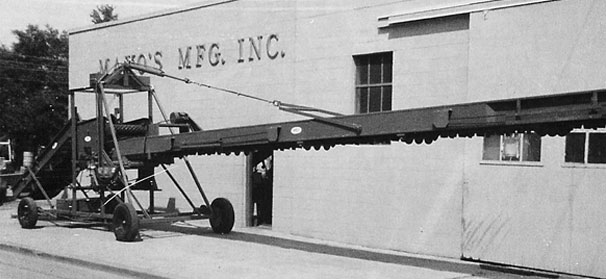
Making Machinery
Machine shops. They’re in most small towns and rural communities. Whether it’s on Main Street, some back-alley location, next to a two-lane highway or in the middle of a wide-open field, that’s where you’ll find someone pounding out an implement or fabricating a piece for a planter, a harvester or a piler.
In many ways machine shops and metal fabrication shops are where many of today’s major equipment manufacturers began. With an original idea, an innovation, an improvement on a piece of equipment that comes from field experience and the discovery that there’s a better way to do it – whatever “it” may be.
Whether it was a new design, a new model or simply tinkering on a piece of equipment that’s how Spudnik, Harriston, Mayo, Crary, Lockwood and Milestone first began their entry into the potato equipment field.
Just as farms have grown larger through consolidation so have the companies. Spudnik is now a subsidiary of the German company, Grimme. Harriston and Mayo have merged operations, as have Crary and Lockwood.
As the industry has grown and evolved, so has the equipment. Today machine shops are still pounding out and fabricating pieces of equipment, but as farming moves into the second decade of the 21st century the machinery has evolved into technology-sophisticated equipment that verges on robotics with touch-screen and GPS technologies representing just the beginning.

Harriston-Mayo
Harriston Industries began in 1973 in Minto, N.D., by Tom Osowski and Tony Osowski. Originally called Minto Machine Shop and was a repair and light manufacturing business. The name was changed to Harriston Industries when they began manufacturing potato equipment.
Mayo Manufacturing was founded in 1952 by Mayo Delisle. His son, Duane Delisle, joined the business in 1953. Mayo Manufacturing also started as a repair and light manufacturing shop and added lines of potato handling equipment during the 1960s and ’70s. Mike and Mark Delisle joined the company in 1977.
In 2006, Harriston and Mayo merged to become Harriston-Mayo. The quality lines of equipment manufactured by each became an unmatched product line of potato equipment. Harriston-Mayo also has a large parts department providing agricultural and industrial drive components in addition to parts to service potato equipment.

Lockwood
In 1935 T.J. Lockwood, a farmer from Kimball, Neb., set out to design a potato grader to help his father and brothers make their farm more profitable.
By 1939 Lockwood decided to move his business to Gering, Neb. He rented a back room in a building on 7th Street for $5 a month. From there, he purchased one building after another, finally owning the entire block. By 1942, Lockwood Grader Co. had grossed $72,000 a year and looking to expand even more.
After World War II, Lockwood Grader Co. expanded into other parts of the country. A branch office opened in Grafton, N.D., to carry spare parts and service equipment in Canada. Soon they built a second plant in Monte Vista, Colo. Other plants went up in Rupert, Idaho; Antigo, Wis.; Robertsdale, Ala.; Presque Isle, Maine; Tulelake, Cal.; Hastings, Fla.; Quincy, Wash.; and Six Lakes, Mich.
In 1950 Lockwood entered the potato harvester market and became the first company to successfully design the PTO pull-type harvester. Lockwood continues to design and manufacture PTO driven harvesters.
In 1957 T.J. Lockwood was diagnosed with brain tumors. He died on Aug. 7, 1957, his 44th birthday. Lockwood Mfg. was acquired by Crary Industries in 1999. The headquarters moved to West Fargo, N.D.

Spudnik
Spudnik was established in 1958 – the same year that the USSR launched the Sputnik satellite Carl Hobbs and his brother Leo Hobbs started the company in a potato cellar in Blackfoot, Idaho.
According to Carl, he and his brother were working for Albert Longhurst and constructed a bin piler for him in 1958. Longhurst rented a blacksmith shop for Carl and Leo in the fall of 1958, and when they finished working on the farm they went to work in the shop building a scooper for Longhurst.
Carl said that one day Longhurst stopped by the shop and he and his brother jokingly said that they were going to build him a scooper. When he returned later that day they had the front end of the scooper built.
Eventually Longhurst decided he wanted to concentrate on his farming operation and sold his share of Spudnik to Carl and Leo.
“We assumed all the debt and paid it back,” said Carl, “we didn’t have any money. He gave us a couple of years to pay it back.”
Carl attributes Spudnik’s early success because he “knew what the machine was made of, and the farmers believed me because I knew what I was talking about.”
Carl said that a lot of the equipment Spudnik built came from talking to farmers and processors then he would go home and design the equipment based on their specifications.
In 2002 the Grimme Group, based in Damme, Germany, purchased Spudnik. Grimme sells and services potato and sugar beet equipment in more than 70 countries globally.

Milestone
Another Blackfoot, Idaho-based company, Milestone was founded by Merthin Miles, Scott Brown and Owen Ward in 1961. Milestone’s first product was the Milestone seed cutter and it remains the company’s flagship product.
The 24-inch wide seed cutter was just the beginning for Milestone. Since then Milestone has continued to diversify it’s product line but Milestone has continued to expand the capacity of its seed cutters. In 2001 they introduced the 72-inch wide seed cutter.














